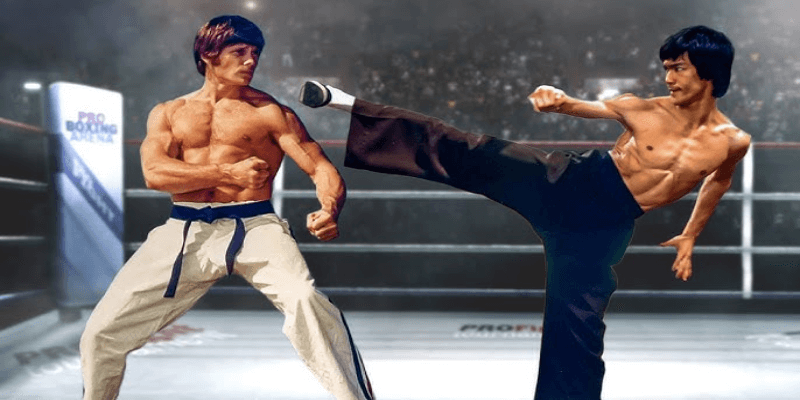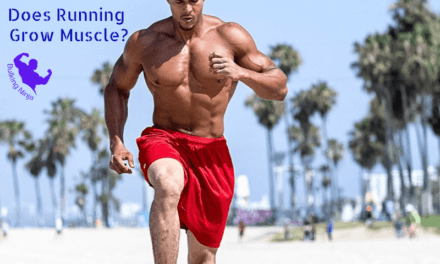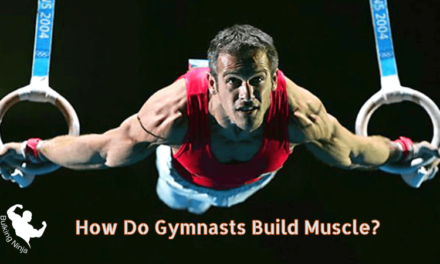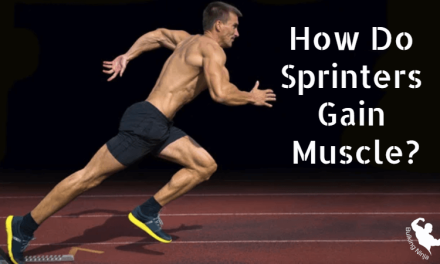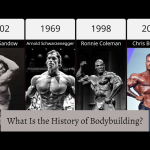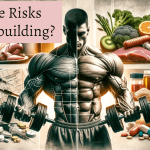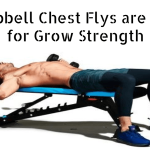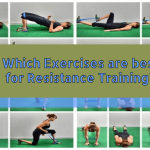Welcome to our blog, where we’re about to dive into the world of martial arts and explore how the ancient discipline of Karate can sculpt not just your mind and self-defense skills, but your physique as well. When we think of muscle-building workouts, images of weightlifting and gym sessions often come to mind.
However, there’s more to building strength and muscle than just pumping iron. Karate, with its rigorous training regimen, offers a unique and holistic approach to enhancing your muscular power, endurance, and overall physical fitness.
In this blog post, we’ll uncover the science behind how does Karate build muscle, shedding light on the incredible physical benefits that this martial art has to offer. Whether you’re a martial arts enthusiast or someone looking for an exciting path to a stronger, leaner body, this exploration of Karate’s muscle-building potential is sure to captivate your interest.
Table of Contents
How Does Karate Build Muscle?
Karate, the ancient martial art that has endured the test of time, is an ideal addition to your workout routine if you desire to build strength, improve flexibility, and enhance coordination.
Through its unique blend of cardiovascular training and muscular exercises, Karate offers a comprehensive approach to building muscle while keeping your joints safe. The body’s engagement in rapid, explosive movements during Karate sessions not only aids in maintaining proper form and balance but also contributes to the development of muscular power.
Furthermore, the acquisition of self-defense skills in Karate boosts your confidence and discipline, making it a well-rounded choice for those seeking a complete weight-training program.
In the journey to explore how Karate builds muscle, one can’t overlook the profound impact it has on both the body and the mind, offering a holistic path to physical fitness and personal growth.
Does Karate Build Muscle?
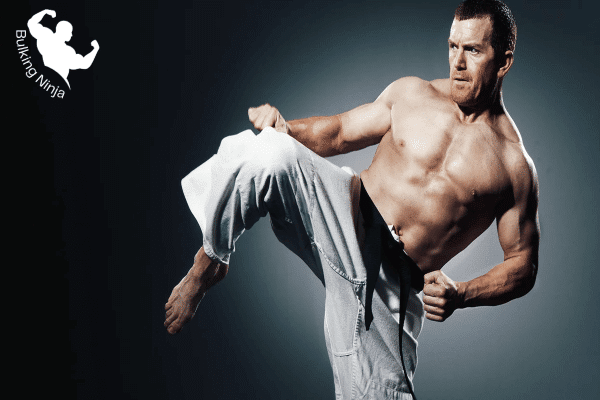
Karate can indeed help build muscle. Karate involves a combination of cardiovascular training and muscular exercises. When practicing Karate, the body engages in rapid and explosive movements, which work various muscle groups and contribute to building strength and endurance.
This martial art also promotes flexibility, coordination, and balance, further enhancing the development of lean muscle. Additionally, Karate’s full-body workout can lead to improved muscle tone and definition over time.
So, if you’re looking to build muscle while learning self-defense skills and improving your overall fitness, Karate can be a valuable choice. read more about pushups are good for gaining muscles.
Upper Body muscles
Arm and Shoulder Muscles
Karate, a renowned martial art, serves as an exceptional avenue for sculpting the upper body, particularly the arms and shoulders. This transformation is driven by the intricate interplay of physics and anatomy. As practitioners meticulously practice their strikes, honing their techniques to deliver the perfect knockout punch, they draw upon the power emanating from their core. This energy, channeled with precision, surges through their deltoids, the prominent muscles in the shoulder region, like pistons, adding an explosive edge to each strike.
In the pursuit of defined arms, Karate enthusiasts delve deep into workouts that not only fortify their deltoids but also engage their triceps for elbow straightening and biceps for bending. This dynamic trio, harmoniously working together, results in the coveted ‘cut shoulders’ effect. Moreover, the second-line support systems receive substantial attention during Karate training, underpinning the robust development of the upper body muscles.
One may even draw parallels to Muay Thai fighters who, too, boast impressively toned shoulders, attributed to rigorous training regimens. The transformative power of Karate, both in terms of building muscles and overall physical prowess, becomes evident as individuals embrace its practice. Further read more Who is best bulking or cutting.
Lower Body Muscles
Back Muscles
Karate is not just a martial art; it’s also a powerful means to build muscle. When you engage in karate, you rely on a combination of physical movements such as kicks, blocks, and bending at the waist. These actions not only promote flexibility but also work your back muscles extensively.
Specifically, the Latissimus dorsi muscles, which attach to your spine, play a crucial role in building a strong back, capable of handling significant weights. To truly build muscle in your back, it’s essential to incorporate exercises that target the sides and top of your back, ensuring a well-rounded development.
In addition to the Latissimus dorsi muscles, the Rhomboids are another essential component in the muscle-building process through karate. Running in a diamond shape from your upper spine to your shoulders, these muscles can be strengthened with exercises like reverse-grip bent-over rows.
Properly developed Rhomboids not only contribute to a strong back but also aid in stabilizing your body during karate movements. However, it’s not just about building muscles; it’s also about safeguarding yourself from potential injuries. Lets start journey withlow protein for growing muscles
Hip and Leg Muscles
In the pursuit of building muscle through Karate, one cannot overlook the vital role played by the hip flexors, extensors, gluteal muscles, and quadriceps. These muscle groups are the unsung heroes behind the powerful kicks, sweeps, and precise blocking techniques that define Karate.
The essence of muscle growth lies in repetition, a principle that holds true not just in Karate but in various martial arts classes, including Muay Thai. Each time you slam your shin into a bag or kick shield, the muscle fibers within your legs are put to the test. This intense workout may cause temporary damage, but it’s in the recovery phase that the magic happens.
As the muscle fibers repair themselves, they become more resilient and robust, primed to withstand future challenges. This process not only enhances your strength but also contributes to increased muscle mass, transforming you into a more formidable martial artist. However, the journey to muscle-building through Karate isn’t an isolated one. Much like the legendary Arnold Schwarzenegger’s dedication to intense dieting and weight training alongside his martial arts regimen, you too can achieve remarkable results. It’s all about balance, intensity, and giving your muscles the time they need to heal and grow stronger.
In the world of Karate and martial arts, learning is a continuous process, and the lessons extend beyond physical techniques. The synergy of training, repetition, and resilience forms the foundation upon which muscle growth and strength are built. The transformation doesn’t happen overnight; it’s a journey that unfolds gradually as you give your muscles the time and attention they deserve. So, in the realm of Karate, muscle building is not just a possibility; it’s an achievable reality for those who are willing to commit to the path of continuous improvement.
Core Muscles
Karate is not just a martial art; it’s a powerful way to build muscles throughout the body. When you engage in Karate, every punch and kick you throw, every fluid motion you execute, starts from the ground up, engaging your core muscles, abdominal muscles, obliques, and even your back and hip flexors. These core muscles are the key to transferring power from your legs to your arms while maintaining excellent posture and balance.
The core musculature, which includes your spine, plays a vital role in supporting your body against the pull of gravity. It enables you to perform complex movements like jumping, landing, running, and walking with grace and strength. This engagement of muscles against gravity is what makes Karate an effective way to build strength and maintain a strong, upright posture.
Furthermore, Karate doesn’t just work on your muscles; it enhances the strength of your joints, such as the knees and shoulders, making them more stable during exercises and sport-specific tasks. As a result, Karate students develop not only muscular strength but also the ability to execute powerful, balanced attacks when facing an opponent who won’t stand still.
The combination of fluid movements, power, and strong core muscles in Karate is a winning formula for building muscle and achieving effective attacks, both in practice and in real-life scenarios. So, if you’re looking to build muscle and improve your physical abilities, Karate is an excellent choice to consider.
Can Karate Help You Lose Weight?
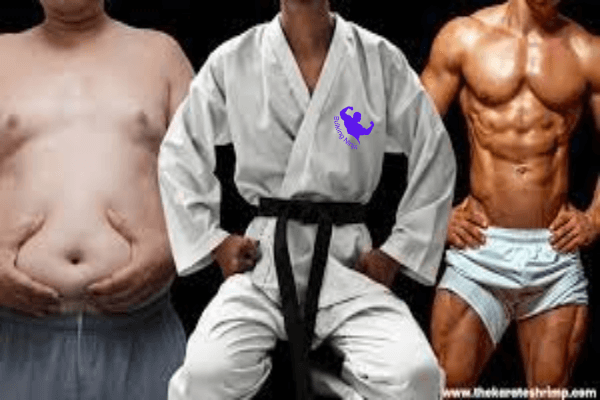
karate can help you lose weight as part of a comprehensive fitness and weight loss program. Here’s how karate can contribute to weight loss:
Calorie Burn
Karate is a physically demanding martial art that involves various forms of exercise, including punching, kicking, and sparring. These activities can help you burn calories and increase your overall energy expenditure, which is essential for weight loss.
Cardiovascular Workout
Karate training can provide a cardiovascular workout, helping to improve your heart health and increase your endurance. Engaging in cardiovascular exercise can lead to weight loss by burning calories during the activity and potentially increasing your resting metabolic rate over time.
Muscle Development
Karate involves a lot of body movements that engage multiple muscle groups. As you progress in your training, you’ll develop lean muscle mass, which can boost your metabolism and help you burn more calories, even at rest.
Improved Flexibility
Karate often incorporates stretching exercises that can improve your flexibility. This can enhance your overall physical performance and make it easier to engage in other forms of exercise that support weight loss, such as aerobics or resistance training.
Stress Reduction
Engaging in karate can help reduce stress and anxiety. High levels of stress can lead to emotional eating and weight gain. By managing stress through activities like karate, you may be less prone to overeating or making unhealthy food choices.
Discipline and Lifestyle Changes
Karate promotes discipline and self-control, which can extend to other aspects of your life, including your diet. Practitioners often become more mindful of their eating habits, making healthier choices that support weight loss.
It’s important to note that while karate can be an effective tool for weight loss, your overall results will depend on various factors, including your diet, the intensity and frequency of your karate training, and your commitment to maintaining a healthy lifestyle.
To achieve sustainable weight loss, it’s recommended to combine karate with a well-balanced diet and other forms of exercise for a comprehensive approach to fitness and weight management. Additionally, consulting with a fitness professional or a healthcare provider before starting any new exercise program is advisable, especially if you have underlying health conditions or concerns.
Which Muscles Are Used In Karate?
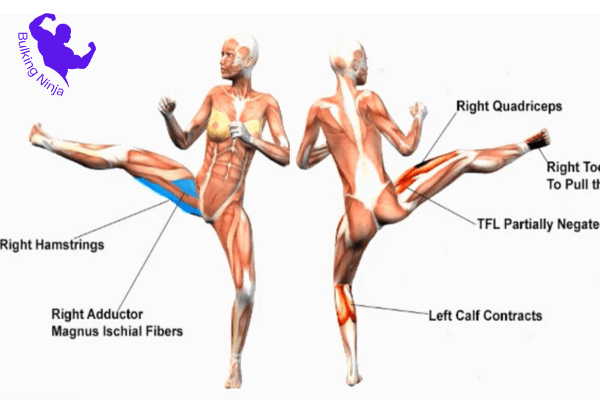
Karate is a martial art that engages a wide range of muscles throughout the body. Different techniques and movements in karate involve various muscle groups. Here are some of the main muscles and muscle groups that are commonly used in karate:
Quadriceps
These muscles at the front of the thighs are heavily engaged in karate for kicking and maintaining a stable stance.
Hamstrings
Located at the back of the thighs, the hamstrings help with leg stability and flexibility during movements.
Abdominals (Rectus Abdominis and Obliques)
These muscles provide stability for your torso and are essential for generating power in punches and kicks.
Lower Back (Erector Spinae)
These muscles help maintain an upright posture and stability during various karate techniques.
Deltoids
These shoulder muscles are used in various striking techniques, especially when raising and lowering the arms.
Triceps and Biceps
The triceps are engaged during arm extension in punches, while the biceps are involved in arm flexion.
Forearms
Muscles in the forearms are used for gripping, blocking, and delivering strikes.
Latissimus Dorsi (Lats)
The lats play a role in upper body movements and stability.
Trapezius
These muscles in the upper back help with shoulder movement and control.
Hip Flexors and Extensors
These muscles are crucial for hip mobility and generating power in kicks.
Glutes (Gluteus Maximus)
The glutes provide strength for hip extension and stability in various stances.
Gastrocnemius and Soleus
These muscles in the calves are vital for footwork, balance, and generating power in kicks.
Neck muscles
These muscles are involved in maintaining head and neck posture during karate movements.
Pectoralis Major
These chest muscles can be engaged when executing pushing and striking movements.
Abductor and Adductor Muscles
These muscles in the inner and outer thighs help with balance and stability during various stances and movements.
It’s important to note that karate involves both static and dynamic movements, and the specific muscles engaged can vary depending on the technique and the style of karate being practiced. Proper warm-up, conditioning, and flexibility exercises are essential to prevent injury and optimize muscle engagement in karate training.
What Are The Health Benefits Of Karate?
Karate offers a wide range of health benefits, making it a valuable martial art for physical and mental well-being. Here are some of the notable health benefits of practicing karate:
Improved Cardiovascular Health
Karate training involves vigorous movements that elevate your heart rate, leading to improved cardiovascular endurance and overall heart health.
Enhanced Strength and Muscle Tone
Karate utilizes various muscle groups, leading to increased strength and muscle tone. This helps improve your overall physical fitness.
Increased Flexibility
Karate incorporates stretching exercises that enhance flexibility, making your body more agile and less prone to injuries.
Better Balance and Coordination
The practice of stances, footwork, and precise movements in karate improves balance and coordination, which can help prevent falls and accidents.
Weight Management
Karate can contribute to weight loss and weight maintenance by burning calories and increasing metabolism through regular training.
Stress Reduction
Engaging in martial arts like karate can reduce stress and promote mental relaxation, helping to improve overall mental health.
Discipline and Focus
Karate emphasizes discipline, concentration, and focus, which can spill over into other areas of life, enhancing your ability to set and achieve goals.
Self-Defense Skills
Learning self-defense techniques in karate can boost confidence and help individuals feel more secure in potentially dangerous situations.
Improved Posture
Karate training often emphasizes good posture, which can help alleviate issues related to poor posture, such as back and neck pain.
Enhanced Reflexes
Karate involves rapid movements and reactions, which can improve your reflexes and coordination, both physically and mentally.
Increased Endurance
Karate training can improve your endurance, enabling you to sustain physical effort for longer periods.
Social Interaction
Joining a karate class provides an opportunity for social interaction, helping to combat loneliness and foster a sense of community.
Self-Confidence
As you progress in karate and achieve milestones, your self-confidence can improve, positively impacting other areas of your life.
Mental Discipline
Karate teaches mental discipline and self-control, which can help with emotional regulation and decision-making.
Cognitive Benefits
The memorization of forms (katas) and strategies in karate can stimulate cognitive functions, including memory and problem-solving.
It’s important to note that the extent of these health benefits can vary depending on your level of commitment and the intensity of your karate training. Additionally, practicing karate safely under the guidance of a qualified instructor is essential to prevent injuries and maximize the health benefits. Always consult with a healthcare professional before starting any new exercise program, especially if you have any underlying medical conditions or concerns.
Frequently Asked Questions
Can you gain muscle from karate?
Yes, martial arts training, including karate, can help you build muscle and improve fitness.
What muscles does karate work?
Karate works the leg, pelvis, torso, and arm muscles through punches, kicks, blocks, and frequent movements.
Can karate build abs?
Karate alone is not enough to build abs. To develop abs, you need to combine karate training with a healthy diet and targeted exercises.
Can karate keep you fit?
Yes, karate can keep you fit by improving cardio conditioning, muscle strength, endurance, and helping with weight management. Katas are also beneficial for older adults to maintain balance and muscle mass.
Which is better gym or karate?
Martial Arts is better for mental health compared to the gym, but the gym may teach you about building muscle or burning calories.
Do karate lift weights?
Karate practitioners may incorporate weightlifting into their training to achieve athletic gains, including muscle growth, fast twitch muscle fibers for explosive movements, endurance, and strength.
Your Title Goes Here
Your content goes here. Edit or remove this text inline or in the module Content settings. You can also style every aspect of this content in the module Design settings and even apply custom CSS to this text in the module Advanced settings.
Conclusion
In conclusion, the question of whether karate can help gain muscle has been answered with a resounding yes. Through its rigorous and disciplined training regimen, karate engages various muscle groups, promoting strength, endurance, and overall muscle development.
The dynamic kicks, powerful punches, and demanding stances challenge both the upper and lower body, leading to increased muscle tone and mass over time.
However, it’s important to remember that the degree of muscle gain in karate may vary depending on individual effort, consistency, and specific training goals. Nevertheless, for those seeking a holistic approach to physical fitness that combines martial arts discipline with muscle-building benefits, karate undoubtedly offers a pathway to achieving a stronger and more resilient body.
So, whether you’re aiming to enhance your strength, flexibility, or overall well-being, karate can be a rewarding journey toward a healthier, more muscular you.
